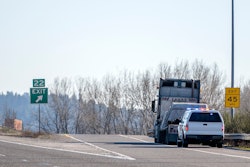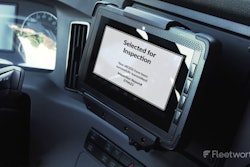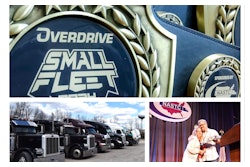The Federal Motor Carrier Safety Administration on April 7 rolled out new features in its Unified Carrier Registration system designed to verify identities and stop bad actors from creating new authorities to double broker or steal freight.
So far, it's had an impact, but perhaps not in a way that's been readily understood by industry watchers.
A May blog post from CarrierOK, a freight data platform, looked at the number of authorities filed for versus the number of authorities published in April, sharing these numbers:
"The Filed-to-Published conversion rate -- typically around 60%-65% in months prior -- cratered to roughly 30% in April. In other words, well over half of all applications filed in April failed to advance past FMCSA’s screening to the Federal Register published stage, whereas before April the majority would have made it through."
CarrierOK didn't claim that meant the system was shutting out fraudsters who couldn't prove their identity. Indeed an Overdrive "test drive" of the new registration system's facial recognition application hit some speed bumps, requiring a few attempts on two different smartphones.
After Overdrive asked about the methodology (looking at authority filings v. published authorities), CarrierOK issued a correction to the blog post, citing a "flawed assumption" in their interpretation of FMCSA data.
"FMCSA’s new identity verification occurs before filing, meaning applicants who fail ID checks never appear in 'Filed' data," the correction states.
While the new ID verification steps haven't cut authority publishings in half, according to FMCSA the new procedures are having some impact.

"The ID Verification technology has proven effective in protecting the integrity of the USDOT Number application process since going live in the FMCSA registration system for new, individual registrants on April 7, 2025," an FMCSA spokesperson told Overdrive. As of May 26, "86% of unique users (20,051) have verified their identities without issue, demonstrating that legitimate applicants are moving through the system efficiently."
The system is "also actively blocking suspicious activity," FMCSA added. "Nearly 14% of new, individual applications (3,195 users) either failed or did not complete the identity verification process. These failed attempts highlight that the system is doing exactly what it was designed to do: detect and deter individuals who may be attempting to use false or stolen credentials to gain access."
[Related: FMCSA's new ID-verification test-drive, live from MATS]
It's impossible to know if those nearly 3,200 users who didn't complete the ID verification were fraudsters or simply having a technical issue. April was still a strongly positive month for carrier authorities granted.
"FMCSA in April granted motor property authority to 5,473 carriers, which is the most since June 2023," FTR Transportation Intelligence VP Avery Vise said.
Dale Prax, owner of Freight Validate and FMCSA's self-described "worst critic," didn't find the ID verification steps all that promising. "FMCSA says they are stopping bad actors that don’t make it through the facial recognition process, but that could be attributed to bad guys feeling out the holes in the system," said Prax. The facial recognition step "simply says who is behind the webcam for a few seconds but not who is actually behind the application or operation."
FMCSA has hung a lot of ambitions on a new registration system. Chiefly among them, an opportunity to fight and prevent fraud, which it recently called a "public safety crisis masquerading as an economic problem."
[Related: FMCSA to introduce 'Motus', new 'one-stop shop' for all carrier business]














